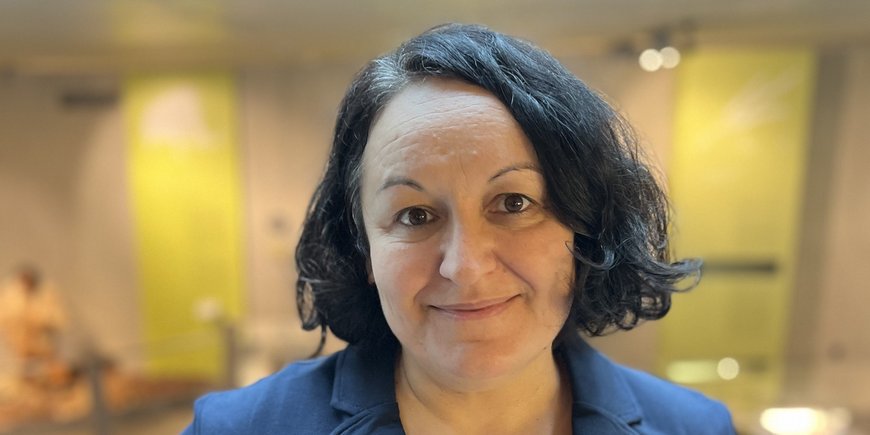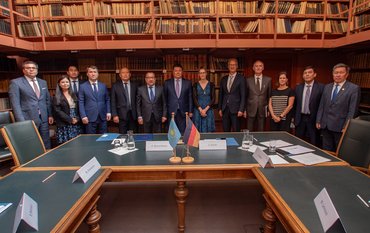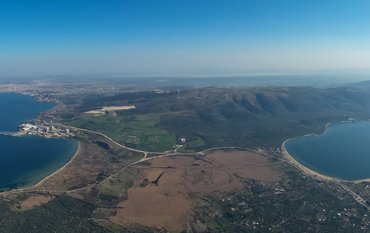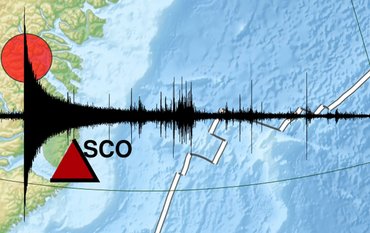Dr Sanja Panovska, project leader in Section 2.3 “Geomagnetism” at the GFZ German Research Centre for Geosciences, has been awarded an ERC Consolidator Grant for her “EXCURSION” project. The prestigious funding award from the European Research Council ERC is associated with a funding sum of around 2 million euros. The aim of their five-year project is to develop the first data-based model of the Earth's magnetic field over the last 780,000 years. A particular focus will be on so-called geomagnetic excursions. These are episodes in which the Earth's magnetic field weakens considerably but does not completely reverse. Such events can reduce the natural protection that the Earth's magnetic field provides from solar and cosmic radiation, potentially impacting technological infrastructure, the environment and climate.
ERC Consolidator Grants enable excellent researchers to consolidate their own research group 7 to 12 years after their doctorate in order to consolidate their scientific independence.
Congratulations from Prof Susanne Buiter, Scientific Director of the GFZ:
“Congratulations to Sanja Panovska for this great success. With her ambitious project at the frontiers of geophysical knowledge, she will not only provide new insights into the evolution of the Earth's magnetic field, but also make an important contribution to the study of the deep Earth, the environment and the palaeo- and space climate. We are delighted that the European Research Council is strengthening this important basic geoscientific research at our centre.”
The project in detail
The project is entitled EXCURSIONS: “Geomagnetic field excursions: revealing the extreme states of Earth's outer core”.
The Earth's magnetic field is constantly changing: it originates in the liquid outer core and varies slowly in space and strength, but occasionally there are major changes, even complete polarity reversals, which occur on time scales of a few thousand years. Episodes of stronger change, which do not show a complete polarity reversal, but in which anomalous magnetic directions develop that deviate from the usual dipolar form, are called excursions. This causes the field to weaken considerably. This reduces its natural shielding effect against solar and cosmic radiation, which can lead to considerable technological and potential ecological and climatic effects on Earth, e.g. due to electromagnetic interactions,.
So far, scientific understanding of geomagnetic excursions is still limited. However, due to the risks mentioned above, it is becoming increasingly important and urgent to investigate these events. Especially since a significant decrease in geomagnetic field strength has been observed in recent centuries.
The EXCURSION project will address fundamental questions about these transitional events in the Earth's magnetic field: What are their exact causes? At what frequencies do they occur? How long do they last? How does the magnetic field develop during this time? And how can such events be predicted? In particular, it is important to understand the dynamics in the Earth's core as well as the global and regional characteristics of as many of these events as possible.
In this project, Sanja Panovska and her team will focus on the geomagnetic excursions in the Brunhes Chron, which covers the last 780,000 years. Their aim is to create the first data-based model of the geomagnetic field for this period - including high-resolution reconstructions of the excursions that took place during this time. These models will be linked to state-of-the-art 3D simulations of the Earth's dynamo to determine the state of the Earth's core and geodynamo during the excursion events. Machine learning methods will be applied to the new models for identifying common features of excursions.
“This groundbreaking synthesis of multiple excursion events analysed with data-based reconstructions, data assimilation through 3D numerical simulations and machine learning techniques will provide a holistic framework and extend our knowledge beyond the current understanding of the dynamics of the Earth's outer core,” says Panovska.
About the person
Dr Sanja Panovska has been a postdoctoral scientist at GFZ since 2016, where she started with a re-entry position in Section 2.3 Geomagnetism. In 2019 she was awarded a GFZ Discovery Fund Fellowship. Since 2023, she has been Principal Investigator (PI) of a project funded by the German Research Foundation (DFG) as part of the Priority Programme (SPP) ‘DeepDyn’. Before joining the GFZ, she was a Post Doc at the Scripps Institution of Oceanography, University of California San Diego (USA). She holds a PhD from ETH Zurich (Switzerland) and both a Diploma in Geophysics and a Master of Engineering from the University of Ss. Cyril and Methodius, Skopje (Republic of North Macedonia). In addition to her scientific work, she is also involved in a variety of public relations activities.








![[Translate to English:] [Translate to English:] Abror Gafurov von dem Schriftzug "Welcome to Azerbaijan" und den UN und COP Logos](/fileadmin/_processed_/2/5/csm_2024_11_Baku_COP29_Abror_Gafurov_1042faec82.jpeg)


![[Translate to English:] Martin Herold standing in front of the library on the Telegrafenberg](/fileadmin/_processed_/c/d/csm_Martin_Herold_d385ee4dd9.jpeg)
![[Translate to English:] Many people are listening to a presentation in the GFZ lecture hall.](/fileadmin/_processed_/c/a/csm_1_Bild1_hell_b9c0e9f5ed.jpeg)






![[Translate to English:] Both scientists sitting on stools in front of a wall of books in the Telegrafenberg library](/fileadmin/_processed_/6/6/csm_Buiter_Castell_DORA_4_e87cb1ea18.jpeg)
![[Translate to English:] Gruppenbild mit 4 Personen](/fileadmin/_processed_/8/d/csm_20241017_GFZ-Emmerman-Medal-005_web_reinhardtundsommer_21a414fa4a.jpeg)






![[Translate to English:] Ice landscape with five red tents](/fileadmin/_processed_/8/9/csm_Zeltlager_auf_dem_Eis_Urheberin_Jenine_McCutcheon_5ced2d523b.jpeg)






